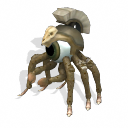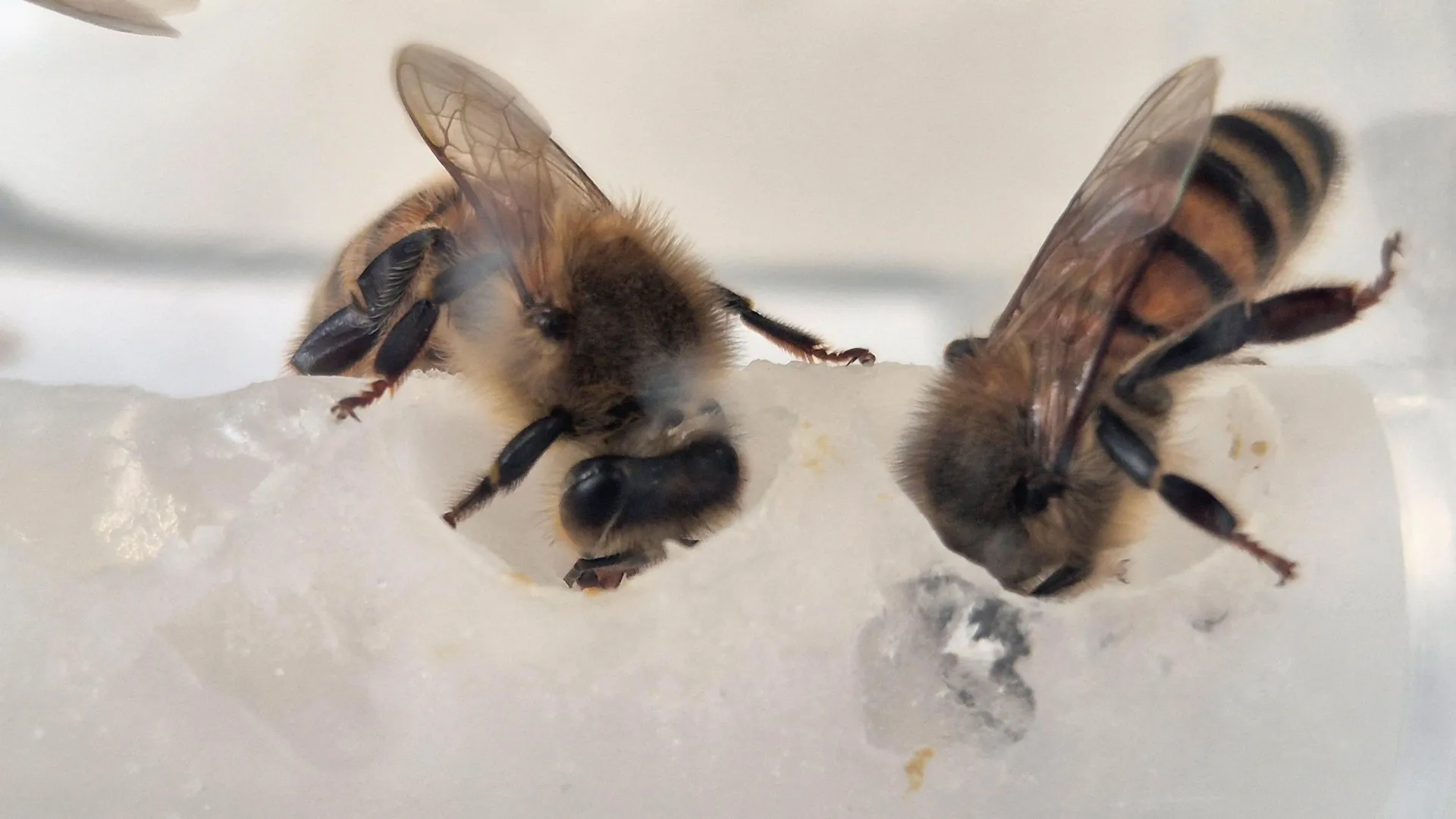Sterols. Lipids found in pollen. Specifically, yeast enriched with sterols.
Doing great work. Thanks.
And of course! Sterols! What I’ve been saying all along!
carols, what I’ve been singing all along
Casseroles, what I’ve been eating all along
Florals, indeed! The shirts I always wear when I’m ready to attract some bees.
Colonies fed with the enriched diet were more likely to continue rearing brood up to the end of the three-month period, whereas colonies on sterol-deficient diets ceased brood production after 90 days.
Uhh m not crazy right, that’s the same thing?
I’m with you, it’s confusing. But I think what it means is this:
The study ran for 90 days. Non-sterol bees had stopped doing bee sex by then. Sterol bees were doin it all the way up to the end of the 90 days - and then the study ended. We can therefore assume they wanted to continue having freaky beedsm sex for even longer.
Gotta be AI bullshit. But I’m reading it as, group A never stopped while group B stopped breeding at the end of the period.
Some were observed brooding for up to 12 weeks!

one group continued to the end of the study period, the other group had stopped by the same time
or, one group stopped doing a thing, and the other group didn’t show signs of stopping
Well this story is the bee’s needs!
In the new study, the research team succeeded in engineering the yeast Yarrowia lipolytica to produce a precise mixture of six key sterols that bees need. This was then incorporated into diets fed to bee colonies during three-month feeding trials. These took place in enclosed glasshouses to ensure the bees only fed on the treatment diets.
Key findings:
- By the end of the study period, colonies fed with the sterol-enriched yeast had reared up to 15 times more larvae to the viable pupal stage, compared with colonies fed control diets.
- Colonies fed with the enriched diet were more likely to continue rearing brood up to the end of the three-month period, whereas colonies on sterol-deficient diets ceased brood production after 90 days.
- Notably, the sterol profile of larvae in colonies fed the engineered yeast matched that found in naturally foraged colonies, suggesting that bees selectively transfer only the most biologically important sterols to their young.
now I want some sterols
Behind the local McDonald’s at 5am…ask for one eyed sterol Joe. Tell him I sent you and thanks for the happy ending, it was real good.
For anyone wanting to save the bees, look into making bee hotels. If you have a power drill and a variety of small bits, easy money. Spend a half hour watching videos, not too much to learn. They’re basically free to make if you can lay your hands on some wood or non pressure-treated lumber. Chunk the old one every year and roll an new one.
Damned cool when you see your first guests having waxed off the entrance hole!
Easy money? Do they pay rent?
*easy honey
take it
If you can collect. All I get are pollinated plants. YMMV.
I researched that, maybe it’s just in Australia but apparently the bees here don’t use those bee hotels? They apparently just get stacked with earwigs. I read the best thing you can do for bees here is plant native flowering plants like the Bottle Brush, and let leaves biodegrade naturally instead of hoovering em up.
Also please check whether honey bees are native in your area. If they’re not (or if there’s too many of them) it leads to decline of other bee species and threatens other pollinators and rare plant species.
Not sure what that has to do with my comment? Bee hotels are for solitary bees, not honey bees. Exactly what we want!
Yep, sorry. Still I kind of think it’s worth repeating over and over, so treat is as not aimed at you :)
Also, stop using pesticides/ herbicides in you garden, plant native flowering plants, mow after they finished flowering, let grass grow a bit, maybe mow alternating areas.
“Oh, so we can kill 15 times more before it becomes an issue” - Monsanto, probably
And then goes on to kill 30 times more.
This is also how profits and tax cuts work for the rich
TL;DR: They found six sterols found in pollen could be produced from engineered yeast and increased brood production dramatically. The article talks about them as essential nutrients but is it possible they are signaling molecules affecting bee behavior?
Your second sentence is your own thoughts, not part of the tldr summary, right? I think you should make that separation clear (in Wikipedia terms, I’m flagging this as “original research”).
Yes, it was. I could add a paragraph break by editing.
But I won’t.
Sterols are steroids
True. Sterols are a subset of steroids. I guess my question was what is the important function of those sterols in promoting progeny production?
Pretty sure you misread the article, it said pierogi production.
This is why bees are so important to our food supply.
also important
I am expecting the Trump Regime to take this miracle and use it to raise Murder Hornet colonies or something.
Genetically engineered to be attracted to minorities and immigrants
Fun facts: “killer bees” are also known as “africanized bees”. In the 1970s there was great alarm in the US about the spread of africanized bee strains because they’re so much more aggressive than European bees. There was even a terrible horror movie about it, but this particular catastrophe never materialized. I had a friend in graduate school in the '90s who was part of a team of scientists investigating the problem. It turns out that if you raise an africanized queen in a temperate climate, the bees she produces are no more aggressive than European bees; likewise, a European queen raised in a hot, tropical climate produces bees just as hyper-aggressive as typical africanized bees. So the entire thing was just bee racism all along. Bracism?
Of course global heating is going to make this a bigger problem everywhere, but fortunately we’ll be fucked a lot worse by all the other problems this is going to produce.
Really? This is super interesting. I have been stressing out about when the swarms of murder bees reach me here in the north still in 2020s and you are telling me this is one of the few things I didn’t need to worry about…
You’re thinking of hornets, not bees.

No, I was definitely thinking about bees so…
Yay, new anxiety!
Nope, they’re just reacting to old news
And I also never heard that it was bracism all along. I always wondered why that faded from public consciousness
Which is scariest? Particularly brutal hornets or swarms of aggressive bees? One bad sting or uncountable stings?
No, no there was a lot of clickbait about this event in the media he’s referring to:
It was also found in the Pacific Northwest of North America in late 2019,[6][7] with a few more additional sightings in 2020,[8][9] and nests found in 2021,[10][11] prompting concern that it could become an invasive species,[12][Ala 1] but in December 2024, the species was announced to have been eradicated completely from the United States.[13]
Adricanized honey bee scare came back in the 2000s, didn’t it?
Anyway, we know the adricanized honey bees were a myth, but adricanized honey badgers are a real force to be reckoned with
deleted by creator
Oh, Trump will definitely cook up some “emergency” as an excuse to stay in power.
Stop giving him ideas.
Rfj jr will ban the substance for being synthetic and not a natural remedy
Um, isn’t this like majorly good news? Like maybe among our most important discoveries?
Sorta. If you’re a beekeeper I can see this being a major deal. Not clear on how hard this yeast is to grow or how well the process scales.
Bees got a threefold problem, and we need to get at the roots of the issue.
-
Pesticides and herbicides. Won’t happen, but governments need to ban these products for consumers, restrict them to professionals. Karen and Ken don’t need a perfect lawn sacrificing the bottom of the food chain.
-
We need to grow more, and more indigenous, plants of all kinds. Working on it in my yard, doing well so far. Last year the bumblebees were so loud I thought it was construction on the next block over. :)
-
Verona mites are a monster issue. They came to America in the 90s and are whipping our ass. Haven’t looked into beekeeping for awhile, not sure where we’re at with that.
-
Good for bee keepers, but most plants are pollinated by wild bees. So this could help, but doesn’t really change much in the grand scheme.
The whole “save the bees” thing is about wild bees, not domesticated ones I think
Yes. Very good news.
Nobel Prize in all categories.
This is the most uplifting science article I’ve read in a while. The process they describe in the article sounds long and involved with many dependent steps. Great work!
Until you realize that wild bees and insects won’t receive that food but the cause of their detriment won’t be adjusted because we now have enough bees to pollinate the fruits on the farms.
I do love native plants and I will deeply mourn the mass extinction of the Anthropocene. You’re not wrong.
But I was choosing the bright side here. It’s a lovely contrast to the destruction of NASA, the NSF, and all the trickle down effects in the science world. This bee work is delightfully from the UK and will be harder to cancel. It will help agriculture keep up with exponential human growth amid climate change and water overuse for slightly longer than it would last otherwise. I’m deeply pessimistic, but the bee thing is a little hopeful, ok?
very ok
Allow native wild flowers and plants to grow and get rid of the damn grass.
I thought the reason they die was pollution. I’m confused at why some new nutrient would save them.
There’s a lot of problems bees (both honey bee and native bees) are facing. There’s varroa mite, a virus spread by mites, pesticides, pollution, habitat loss, monoculture… a lot of stuff. However, healthy bees are more resilient, so healthy hive is much more likely to shrug off a event that could be “the straw that broke the camels back” for a weakened malnourished hive.
subscribe to more bee facts!
(long as you leave seinfeld out of this)
They die for a variety of reasons, including disease, pollution, heat waves, etc. Not being half starved of essential nutrients means that they’re more resilient.
From the article:
[Unaffiliated expert] said: “[…] bees face many stressors. Good nutrition is one way to improve their resilience to these threats, and in landscapes with dwindling natural forage for bees, a more complete diet supplement could be a game changer. This breakthrough discovery of key phytonutrients that, when included in feed supplements, allow sustained honey bee brood rearing has immense potential to improve outcomes for colony survival, and in turn the beekeeping businesses we rely on for our food production.”
I expect there are dozens of different things that influence how well a hive does, some good, some bad. Maybe having better nutrition overpowers the effect of pesticides, varroa mites, etc.
I thought that honeybees were the last bees that we should be saving since they harm native bee populations, which are move vulnerable.
The European honeybee in the Americas is kinda a double edged sword. It’s an invasive species, which both steals resources from and spreads diseases to native bees. However, for better or worse at this point a good portion of agriculture is dependent upon the European honey bee.
… And they produce honey, which I like.
Capitalism. I should have known. Thanks for the context!
It’s a little more complicated than that, honey bees are great generalists and there have been a lot of winners among North American plants. But yeah, “capitalism” isn’t far off the mark.
…how do you arrive at Capitalism from “a good portion of our agriculture”?
Simple. A good portion of our agriculture is based on capitalism. Prior to the industrial revolution (capitalism) there weren’t nation sized monoculture farms full of identical genetic freakshow plants.
Because agriculture itself isn’t a problem. Rampant (and unnecessary) exploitation, to satiate artificial scarcity is.
Because as we all know, socialists don’t need food.
Here’s an idea…feed native bees this stuff as needed?
It’s probably useful for other types of bees too.
I know it’s hard for some people to get their heads around, but there are literally dozens of places that aren’t in America.
I doubt such distilled diet would suffice/be benificial in the long run but maybe see it as rations whilst banning pesticide and create more diverse flora ecosystems. That might bee life-saving for mans best insect friend.
Somebody tell Einstein.
Just so you know, the truthfulness of Einstein bee quote is rather dubious, and that’s probably why you’re getting down voted.
RELEASE THE EINSTEIN FILES
I know















